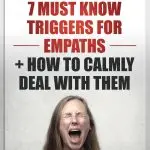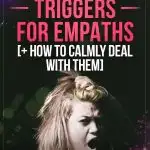We hear the word “triggered” an awful lot these days.
Any time someone gets angry about pretty much anything, people say they are “triggered”.
But, while it is an overly used catchphrase, there are times when some people are truly triggered.
Take empaths for example. It doesn't take much to trigger an empath, because they are so sensitive to the emotions of others.
The triggers for empaths can be so severe that they can even cause PTSD in some.
The empath will often end up with a swirl of emotions going on, and this can be extremely upsetting for them.
Today we are going to discuss the main triggers for empaths, and how to deal with these triggers.
Let's get started.
What is a Trigger for an Empath?
It doesn't take much for an empath to feel sensory overload.
Sure, there are times when some people trigger others on purpose, but for empaths, it doesn't necessarily have to be a purposeful trigger that sets them off.
Empaths must learn how to control their emotions, and how to control how they feel when they take on the emotions of others.
Otherwise, they are constantly struggling with dealing with emotions.
Let's take a look at some of the most common triggers for empaths.
What Are The Common Triggers For Empaths?
1. Feeling the Pain of Others
An empath can feel the pain of others, and often takes on that pain as their own.
They deal with the pain of others on top of their emotional pain.
When someone is suffering, an empath is likely going to be right by their side to help get them through the rough patch.
Afterward, the empath will be the one to suffer, because they have taken on these emotions.
It is important for the empath to know and understand this emotional trigger.
That is the only way they are going to be able to learn how to deal with it so the added emotions do not crush their spirit.
An empath can end up feeling emotionally drained after helping someone else.
This is not healthy, but many empaths are unable to understand how to deal with this and move on.
This is because not only do empaths carry the emotions of others, they tend to hold on to these emotions for a very long time.
The empath is like a sponge when it comes to emotions.
It is important for an empath to be able to set boundaries in order to prevent becoming emotionally drained.
Not only will this help the empath to help themselves, it will also add to what they can do to help others.
By setting these boundaries, the empath is helping others to learn how to help themselves.
2. Feeling Misunderstood
The second on this list of triggers for empaths is feeling misunderstood. An empath is a person who feels strongly and has a huge sense of caring and responsibility for others.
They will often take on the emotions of others, and in many cases, not only do they not understand their emotions, neither does anyone else.
It is important for empaths to feel understood.
When they feel that they are not understood, it can lead to them feeling like there is something wrong with them, mentally.
Many people do not even realize that they are empaths, and these feelings are even more difficult for these people.
They often feel like they are crazy, and that they must need mental health counseling.
Actually, to be able to understand and take on the feelings of others is a sign of very high emotional intelligence. It is a gift that you should never waste.
Unfortunately, when an empath feels misunderstood, it is difficult for them to be able to communicate how you feel to the rest of the world.
So, they begin to feel even more misunderstood, and begin to worry that they can't even understand themselves.
The empath needs to realize that this is not a mental illness and that they have a very special gift that only a small percentage of the world's population has.
The empath has the ability to feel others, and help them.
If you are an empath and you often feel misunderstood, know that you are the only person who truly needs to understand how you think and feel.
Do not worry if others don't understand you.
3. Feeling Unvalued

Feeling valued and feeling wanted may seem very similar, but they are actually two very different things.
Unfortunately, when many people feel like they are not valued, this can cause them to become emotional.
The emotional impact of the feeling of worthlessness is even stronger for the empath.
Remember, this is a person who feels emotions much more strongly than others, both their own emotions and the emotions of others.
Once an empath feels like they are not valued, it can cause them to spiral emotionally.
They feel worthless and are often unable to see their own worth.
It is important for the empath to know that not only do they have value to those they love, but the world as a whole also needs them.
The empath is the person who ultimately is going to be able to understand and help others.
There are many ways a person can be valued.
For the empath, it is of the utmost importance that they are appreciated by others, but they often do not feel as though they are.
If you are an empath, do not let your emotions and insecurities get the best of you.
You have been put on this planet for a reason, and that is to be the person that others turn to in their times of need.
RELATED: 67 Quotes About Feeling Worthless That Most Can Relate To
4. Feeling Unloved
Love is one of the strongest and most important emotions for anyone, and it is even more important for the empath.
This is a person who genuinely needs to feel loved at all times.
When an empath feels as though no one loves them, it can lead to severe depression.
But, many will cut themselves off from others simply to avoid heartbreak.
We have all experienced heartbreak at one time or another.
But, an empath feels it much more deeply than others, and it can lead to many emotional issues later on.
Everyone longs to be loved, and the empath is no different.
When they feel like they are not loved, it can cause pain so deep within themselves that they feel as if they will never heal.
Unfortunately, many empaths often tend to have low self-esteem, as we already mentioned, which leads them to believe that they are not loved and that they are not even lovable.
Empaths need to know that they are loved, and they have been since birth.
There is always going to be at least one person in everyone's life who loves them unconditionally.
What the empath doesn't realize is that because they are so caring towards others that people are automatically drawn to them.
They are much more loved than they may realize.
5. Feeling Unaccepted
There are always going to be times when a person feels left out for one reason or another.
This hurts, but no one feels that hurt as much as the empath.
Empaths, like most people, have a deep-seated need to feel accepted.
As soon as they do not feel like they are accepted, they feel very left out, and they can become quite emotional.
One of the biggest problems for an empath is because they have such strong feelings and are so loving, they expect others to be the same.
Unfortunately, it doesn't always work that way in the real world.
Feeling understood and feeling accepted often go hand-in-hand.
When we feel accepted, we feel loved and understood by those who accept us.
When we do not feel accepted, we do not feel love.
When an empath feels as though they have been rejected, it can cause a great deal of anxiety and depression.
Many empaths can control these emotions with a lot of practice, but others still have a long way to go in learning how to process these feelings.
The empath must put the highest priorities on the relationships they already have.
Sure, it's nice to be accepted by strangers, but it is important to learn that this is not always necessary.
6. Feeling Wanted

Believe it or not, feeling wanted is one of the triggers for empaths.
In many cases, empaths are so sensitive that they feel like they are not truly wanted anywhere.
This couldn't be farther from the truth.
Most of us have experienced abandonment and hurt in our lives.
This can leave many people feeling like they are not good enough to be with any other people.
Suddenly, they are told that they are indeed wanted, and this is a complete shock to their system.
They still wonder why people want them around because they are often very insecure about their own thoughts and feelings.
In many cases, when someone makes an empath feel unwanted, it has absolutely nothing to do with the empath at all.
It could simply be that the person is very toxic, and not someone the empath should be around.
It is important for the empath to learn that they truly are wanted by those who they love and who love them.
It is important to know this, and for the empath to never let anyone make them feel unwanted.
This will take a lot of work, and for the truly insecure and emotional empath, it could feel nearly impossible.
But, it is worth the work in order to learn how to deal with this particular emotional trigger they can experience as an empath.
RELATED: 65 Powerful Empath Quotes To Make You Feel Understood
7. Feeling Expectations and Demands from Others
There are always times when we expect and demand things from others, and when others expect and demand things from us.
For most of us, it isn't so difficult to deal with.
But, this can be one of the biggest triggers for empaths.
An empath is a person who is always happy to help others, but they can often be overwhelmed by the demands of others.
Still, they will continue to help until they are completely burned out themselves.
This is because in many cases, helping others brings the empath a feeling of personal satisfaction.
After a while, that feeling of satisfaction isn't all they are going to feel.
They are going to end up feeling emotionally drained, and many empaths do not know how to deal with this.
Most empaths absolutely hate to think that they may have disappointed someone in any way.
This is something that the empath really needs to learn how to deal with.
So, the empath must learn that they simply cannot help everyone.
It is okay to disappoint others sometimes.
In fact, it can often be unavoidable.
When one's own mental health is at stake, it is important that they take the time to take care of themselves.
This is when the empath needs to take a step back and let others deal with their own issues.
Now we've looked at the main triggers for empaths, let's look at how to deal with those triggers.
How to Deal with Triggers as an Empath

Navigating these triggers is a skill empaths need to develop, and the first step involves an intimate introspection to comprehend their own thoughts and emotions.
A negative emotional trigger, stemming from past experiences or conditions, can seemingly alter an empath's reality.
For example, one might have been told during childhood that they weren't adequate—either in intelligence, physical appearance, or emotional resilience.
These comments, often casually made, can deeply embed in the empath's psyche and color their self-perception.
These beliefs, however, don't have to be life sentences.
Embracing a path of personal transformation, empaths can shift these deep-seated feelings and turn them into a source of positivity.
To rewrite their emotional narrative, they must delve into self-analysis to understand why certain emotions emerge and how they can transmute these experiences into positive self-realizations.
By examining their self-perceived flaws, empaths can reframe them not as defects, but as unique attributes that add depth to their character.
False beliefs about oneself significantly impact self-confidence, which, for an empath, can be eroded by a single negative comment.
Yet, with commitment and determination, they can rebuild their confidence and nurture their emotional resilience.
Emotional triggers, left unaddressed, can fester over time, casting a shadow over the empath's sense of well-being.
Thus, resolving underlying anger, hurt, and trauma is essential for them to forge ahead and embrace happiness.
The following three-step process offers guidance on how empaths can proactively address their emotional triggers:
1. Know the Triggers
To begin the healing process, an empath must first map their emotional landscape.
This includes identifying what triggers them.
The triggers could be specific situations, people, places, or even words.
Once these triggers are identified, strategies can be put in place to mitigate their impact, empowering the empath to navigate life with greater emotional stability.
2. Know where the Triggers Started
Understanding the roots of emotional triggers is an integral part of the healing journey.
Every trigger has a history. It could be a childhood incident—like being ridiculed for one's weight—that sowed the seeds of self-doubt and discomfort.
Recognizing the origins of triggers paves the way towards self-understanding, providing valuable insight into personal narratives that might be influencing present perceptions and reactions.
3. Turn Negative Believes into Positive Ones
With a clear understanding of their emotional triggers and their origins, an empath is now equipped to challenge these negative beliefs.
This is the stage for transmutation—converting negative energy into a positive force.
An empath needs to internalize the understanding that past experiences do not define their worth or reality.
They are deserving of love, respect, and happiness just as they are.
To achieve this, empaths can use positive affirmations, practicing self-compassion and acceptance.
By rewriting their emotional scripts, they can transform their negative beliefs into empowering ones.
This practice not only reduces the power of triggers but also bolsters self-esteem and fosters emotional well-being.
RELATED: How to Deal With Life As An EMPATH and THRIVE!
Empath Triggers: Wrapping It Up
If you are an empath, chances are you have taken on the emotions of others on more than one occasion in your life.
This is not necessarily a bad thing.
Just remember, you are only human, and you can't help everyone.
This is particularly true if you are unable to help yourself.
Work on yourself and learn how to avoid triggers for empaths.
Never stop loving and caring, especially when it comes to yourself.
Thank you, I hope you found this article on the triggers for empaths helpful.
Please feel free to check out these other Empath articles:
- The Earth Empath: 11 Signs You Are This Unique Type Of Empath
- How To Love An Empath (11 Thoughtful Ways To Express It)
- Heyoka Empath – 11 Signs You Are This Powerful & Rare Kind Of Empath
- 7 Best Protection Crystals for Empaths
Alan is the founder of Subconscious Servant. He has a passion for learning about topics such as spirituality and the metaphysical world. The thing he loves to explore most though is manifesting with the law of attraction ✨.



